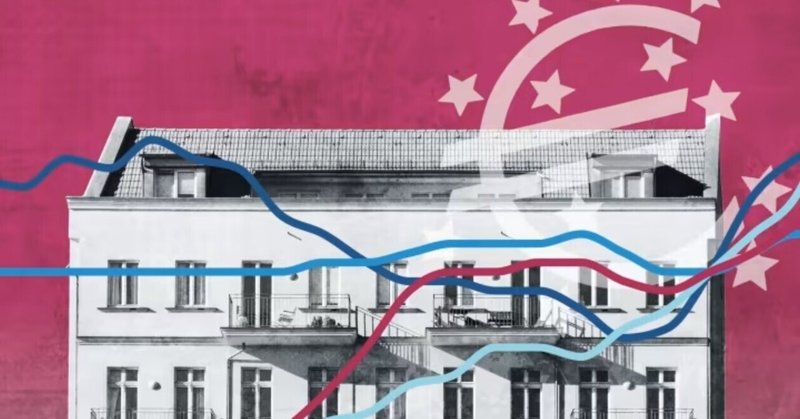
極端な賃貸料: 金利上昇がヨーロッパ全土のテナントにどのように悪影響を及ぼしたのか/FTを読む
Extreme renting: how rising rates turned the screws on tenants across Europe
極端な賃貸料: 金利上昇がヨーロッパ全土のテナントにどのように悪影響を及ぼしたのか
Heated market in housing hotspots is compounded by increasing mortgage costs deterring buyers
住宅ホットスポットの過熱する市場は、住宅ローンコストの上昇により購入意欲がそがれ、さらに悪化している
Marianne B and her partner had owned their Paris flat for seven years when they decided to buy a bigger one after their second child was born. They discovered the perfect apartment for a price that fell within their budget.
マリアンヌ B と彼女のパートナーはパリのアパートを 7 年間所有していましたが、2 人目の子供が生まれた後、より広いアパートを購入することに決めました。 彼らは予算内に収まる価格で完璧なアパートを見つけました。
But then they spoke to lenders — and decided to plunge back into the rental market instead. Their reason: the cost of credit.
しかしその後、彼らは貸し手と話し合い、代わりにレンタル市場に戻ることを決定した。 その理由は、信用コストです。
“Borrowing €800,000 would cost us €500,000 [in interest] compared with €50,000 for €500,000 in 2019,” said Marianne, who asked that her full name not be used. “It just doesn’t make sense. We’re going to have to turn to a rental again.”
マリアンヌさんは「80万ユーロを借りると、(利息で)50万ユーロかかることになるが、2019年の50万ユーロの場合は5万ユーロだった」と述べ、フルネームを明かさないことを求めた。 「それは意味がありません。 またレンタルに頼らざるを得なくなるだろう。」
Like Marianne’s family, many Europeans are being pushed into rentals as high borrowing costs, income requirements and the need for large deposits make buying homes unfeasible. But they are joining an already heated market.
マリアンヌさんの家族と同じように、多くのヨーロッパ人は、高い借入コスト、収入要件、多額の頭金の必要性により住宅の購入が現実的ではないため、賃貸住宅に追い込まれている。 しかし、彼らはすでに過熱している市場に参入しようとしている。
Rents in European cities such as London, Paris and Berlin are at their highest level on record; renters are feeling the squeeze from the Greek islands to Tallinn. As more middle-class buyers are forced to stay in rented homes, that extra pressure on the market has added to costs for tenants on lower incomes in sought-after locations.
ロンドン、パリ、ベルリンなどのヨーロッパの都市の家賃は史上最高水準にある。 賃貸人はギリシャの島々からタリンまでの圧迫感を感じている。 より多くの中産階級の購入者が賃貸住宅に住み続けることを余儀なくされているため、市場への余分な圧力により、人気の高い場所で低所得のテナントのコストが増加しています。
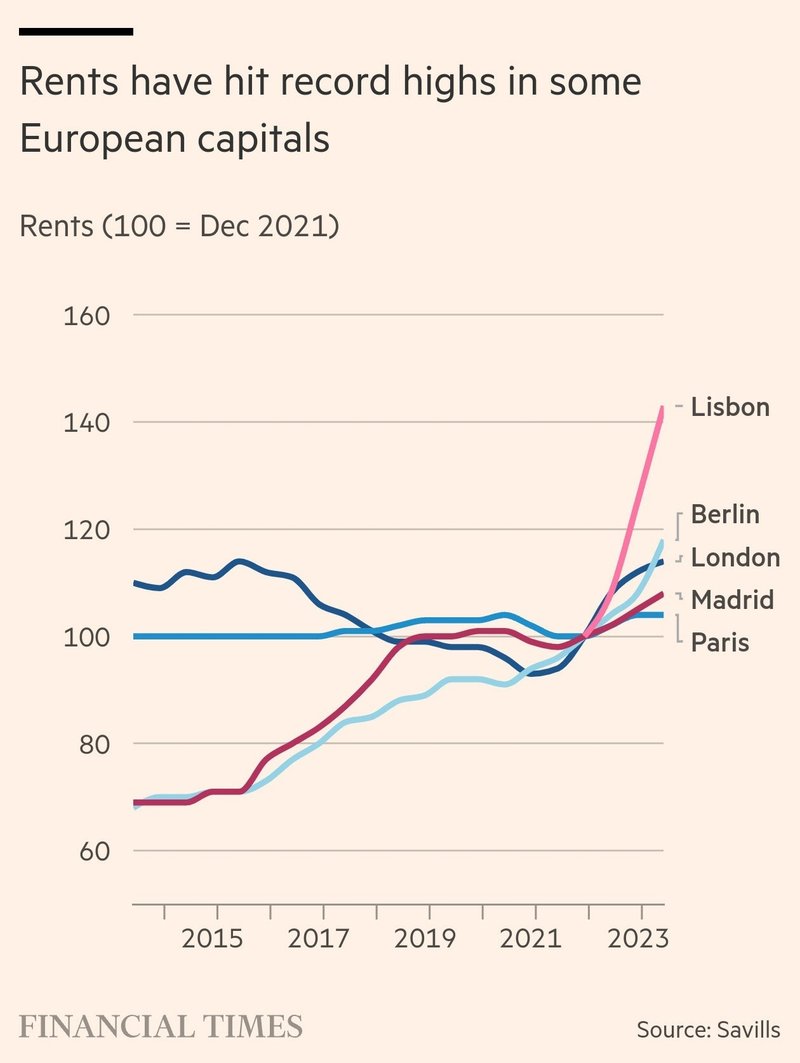
Some home seekers have been driven to solutions ranging from living in vans to developing their own internet plug-ins to help snap up desirable homes. Yet there are few workarounds; overcrowding is worsening and a scarcity of dwellings is keeping millions of young people at home with their parents, shaping their lives through to the age of parenthood and beyond.
家を求める人たちの中には、バンで生活したり、独自のインターネット・プラグインを開発したりして、魅力的な家を手に入れるための解決策に駆り立てられている人もいる。過密状態は悪化し、住居が不足しているため、何百万人もの若者が親元で暮らし、親になる年齢まで、そしてそれ以降の人生を形成している。
Surging prices in London led Emily, a 29-year-old visual artist, to sleep on her sister’s sofa each week from Monday to Thursday. At weekends, she sleeps in a room that is rented to someone else during the week.
ロンドンの物価高騰のため、29歳のビジュアルアーティストのエミリーは月曜日から木曜日まで毎週妹のソファで寝ることになった。 週末には、彼女は平日は他の人に借りている部屋で寝ている。
“I can’t justify paying over £1,000 [a month] for a room, especially if it’s not [going] towards a mortgage,” she said. “You’re just paying to exist and not even paying to fully be able to enjoy what the city has to offer because you’re just trying to keep a roof over your head.”
「特にそれが住宅ローンに充てられないのであればなおさらです。ただ存在するためにお金を払っているだけで、屋根を頭上に維持しようとしているだけで、この街が提供するものを十分に楽しむためにお金を払っているわけでもないのです。」そう彼女は言った。
Paul Tostevin, head of world research at estate agency Savills, said: “Rents are rising across Europe in the face of limited supply and strong demand from domestic renters, international tenants moving for work and study, and would-be purchasers who have turned to the rental market amidst high interest rates.”
不動産会社サヴィルズのワールド・リサーチ・ヘッド、ポール・トステヴィンは言う: 「供給が限られる中、国内賃貸業者、仕事や留学のために移り住む外国人入居者、金利高騰の中、賃貸市場に目を向けた購入希望者の強い需要に直面し、欧州全域で賃料が上昇している。
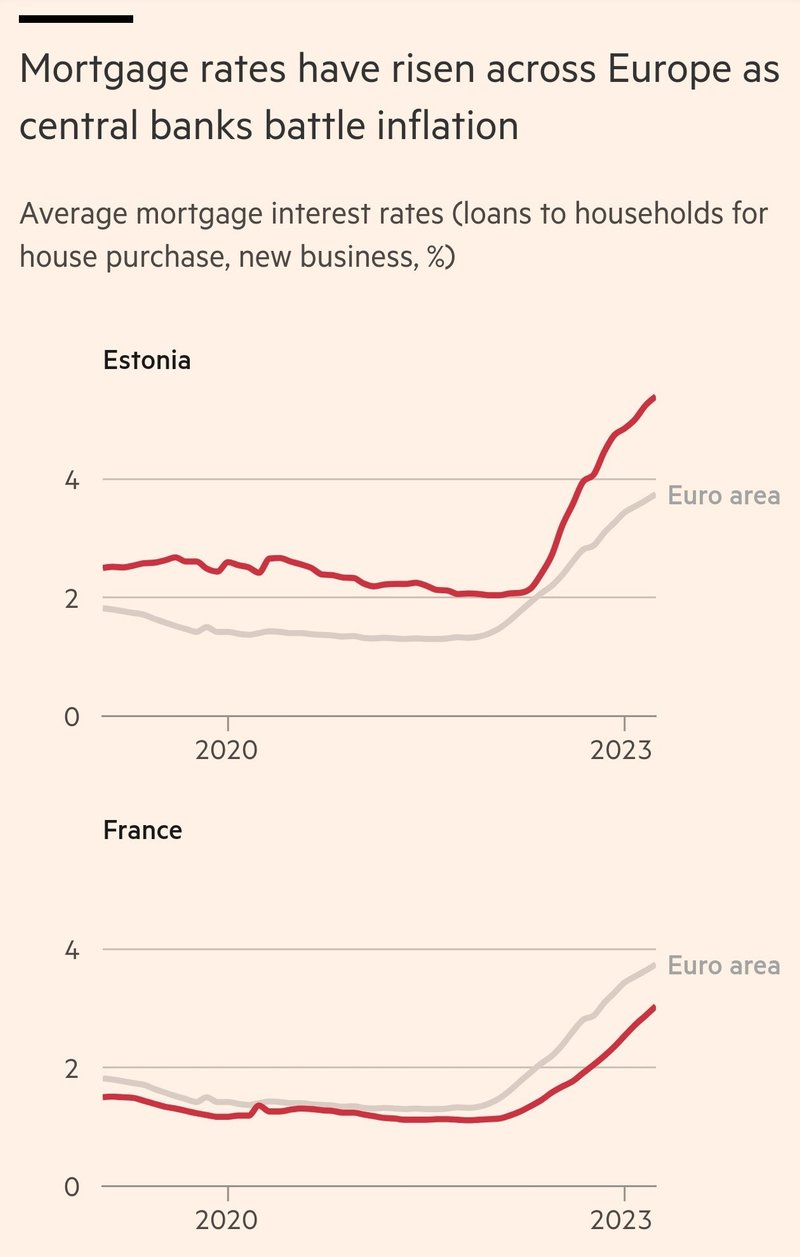
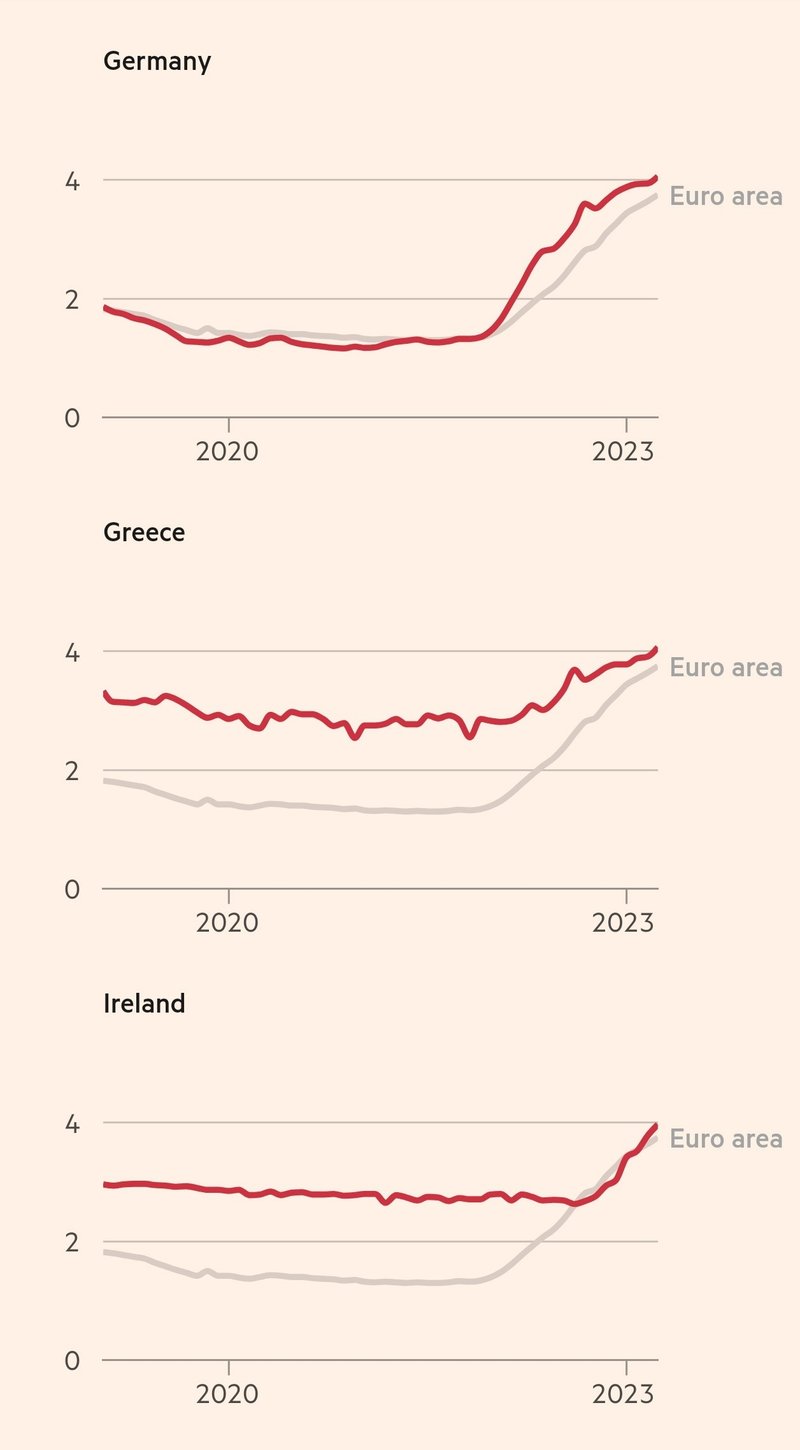
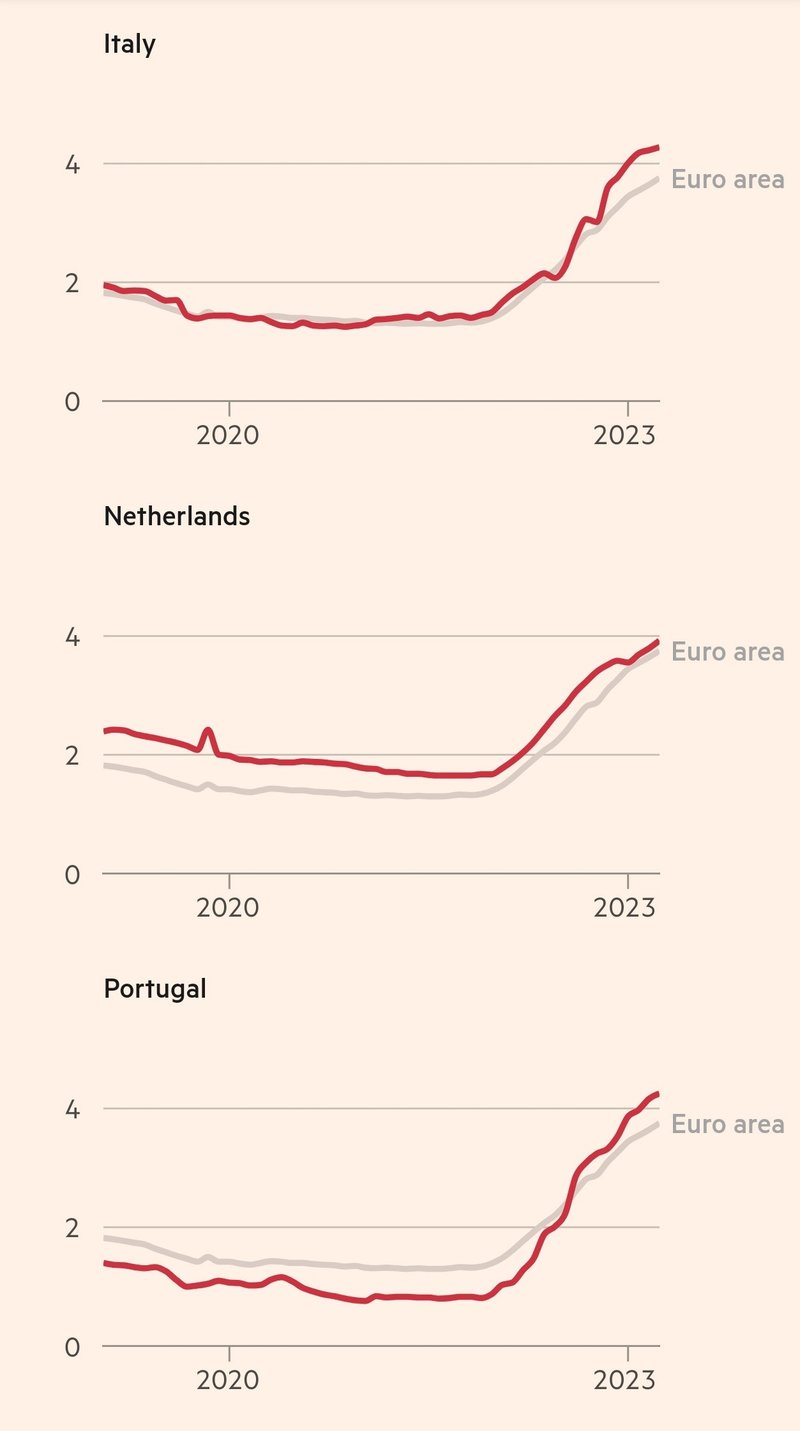
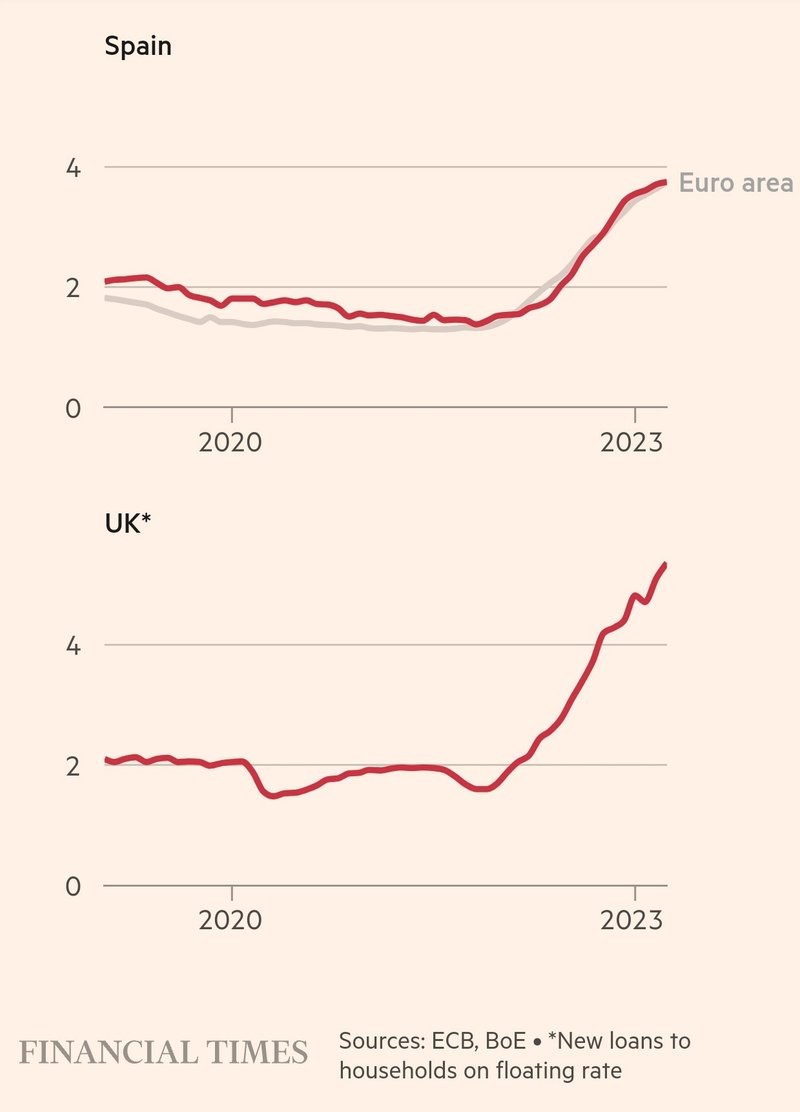
Rising rates have added to the costs facing those climbing on to the housing ladder, making that transition yet more difficult.
金利の上昇により、住宅へのはしごを登る人々が直面するコストが増加し、その移行がさらに困難になっています。
While average rents in some European countries have fallen in recent years, the cost of housing in employment centres and tourism hotspots continues to reach fresh highs. But a shortage of homes is leaving these areas unable to meet demand; at the sharp end, that means homelessness is rising.
ヨーロッパの一部の国では近年、平均家賃が低下している一方で、雇用センターや観光スポットの住宅価格は新たな高値に達し続けている。 しかし、住宅不足により、これらの地域は需要を満たすことができなくなっています。 端的に言えば、ホームレスが増加していることを意味します。
“If I have to give a one-word explanation of the issue it’s: supply,” said Boris Cournède, acting head of public economics at the OECD. Yolande Barnes, a professor at University College London’s Bartlett Real Estate Institute, said: “These cities are victims of their own success.”
「この問題を一言で説明しなければならないとしたら、それは供給だ」とOECD公共経済部門責任者代理のボリス・クルネード氏は語った。ユニバーシティ・カレッジ・ロンドンのバートレット不動産研究所のヨランド・バーンズ教授は、「これらの都市は自らの成功の犠牲者である」と述べた。
Populations are urbanising over the long term, one critical underlying trend, but the Covid-19 pandemic created hyperlocal pockets of insatiable demand in specific cities and neighbourhoods. Rennes and Marseille in France are among places that have experienced jumps in interest since the pandemic began, as tenants look to live closer to green spaces or by the sea to improve their quality of life.
人口は長期的に都市化が進んでおり、これは重要な基本的な傾向の 1 つですが、新型コロナウイルス感染症のパンデミックにより、特定の都市や近隣地域に飽くなき需要が存在する超局地的な地域が形成された。 フランスのレンヌとマルセイユは、パンデミックが始まって以来、関心が急上昇している地域の一つで、テナントは生活の質を向上させるために緑地や海の近くに住もうとしている。
“Everybody during the pandemic became very aware that home doesn’t stop at four walls,” said Barnes.
「パンデミックの間、誰もが家は四方の壁にとどまらないことを強く認識するようになりました」とバーンズ氏は語った。
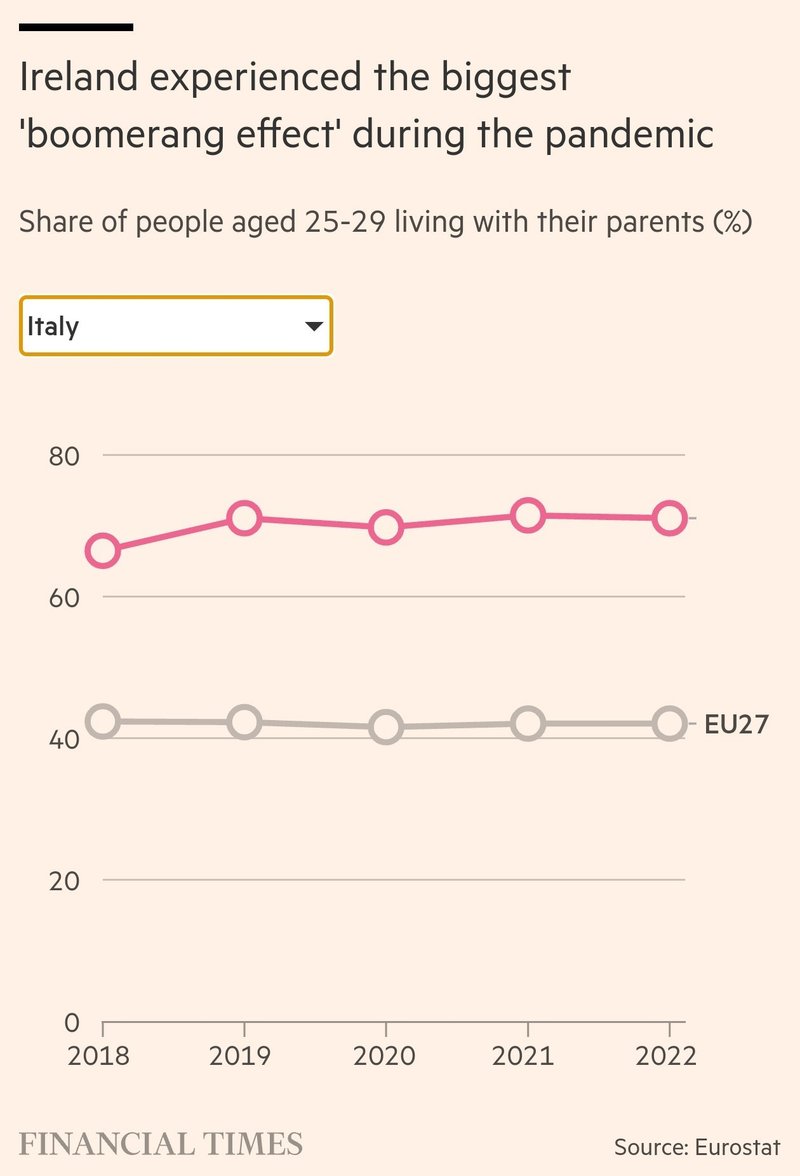
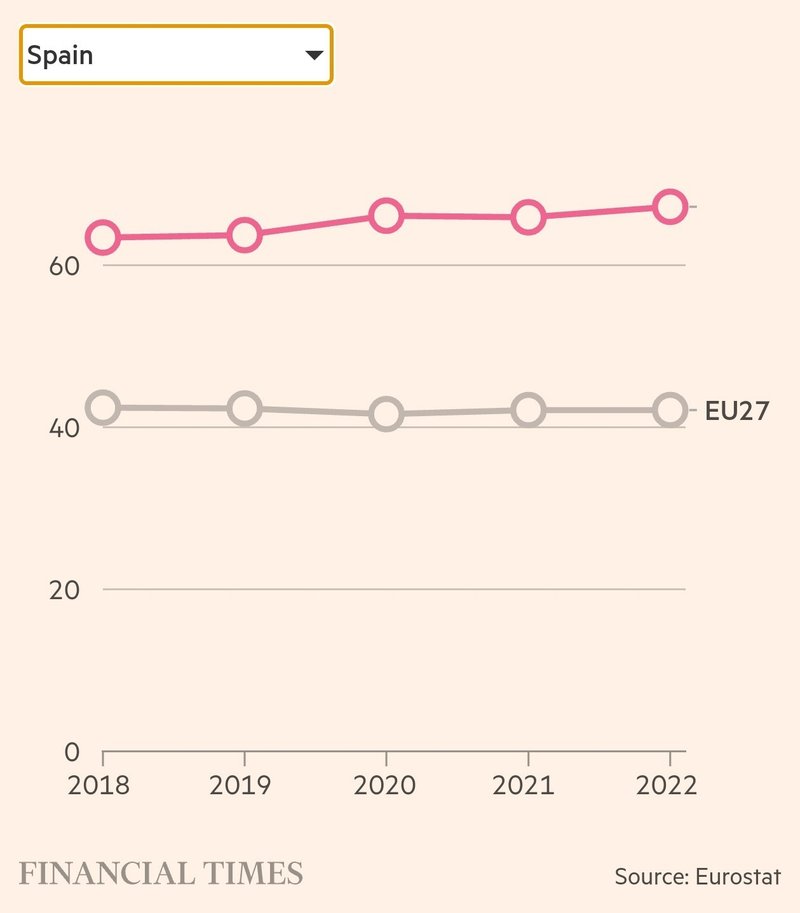
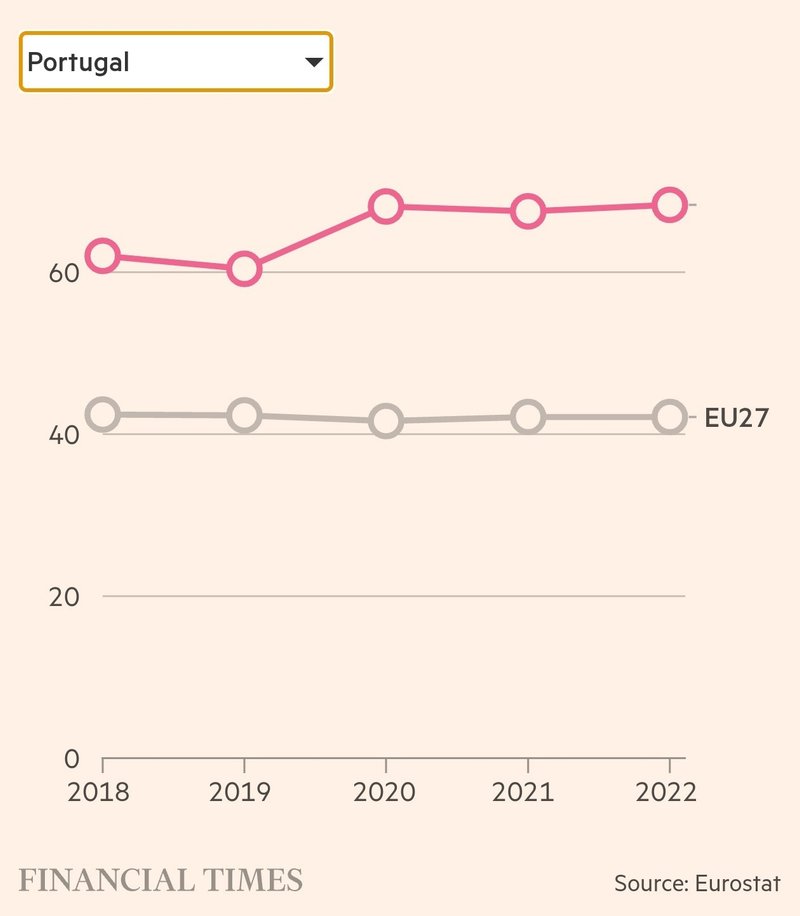
Governments have sought to contain their populations’ living expenses after energy, food and other crucial costs rose in recent years, alongside the cost of housing. But attempts to control housing costs can backfire.
近年、住宅費に加えてエネルギー、食料、その他の重要なコストが上昇したことを受け、各国政府は国民の生活費を抑制しようと努めてきた。 しかし、住宅費を抑制しようとする試みは裏目に出る可能性がある。
Lisbon recorded one of the fastest increases in rents in the six months to June, data from Savills shows, partly because impending rent control policies led some landlords to pre-emptively raise rents. In Berlin, while a cap on rents was struck down in court two years ago, other rent controls on some properties mean their residents enjoy cheap prices for spacious homes, while newcomers are priced out of many parts of the city and landlords wield immense power.
サヴィルズのデータによると、リスボンは6月までの6か月間で最も急速な家賃上昇を記録した都市の一つで、差し迫った家賃規制政策により一部の家主が先回りして家賃を値上げしたことも一因となっている。 ベルリンでは、2年前に裁判所で家賃の上限が撤回されたが、一部の物件では他の家賃規制が行われており、居住者は広々とした家を格安で享受できる一方、新規参入者は市の多くの地域から価格が設定され、地主が絶大な権力を握っている。
Sarah Coupechoux, head of Europe at the Abbé Pierre foundation, a housing charity, said the shortage of affordable housing had sparked a “natural selection” process for tenants that was hitting young Europeans particularly hard.
住宅慈善団体であるアベ・ピエール財団のヨーロッパ責任者サラ・クーペシュー氏は、手頃な価格の住宅の不足がテナントの「自然選択」プロセスを引き起こし、特にヨーロッパの若者に大きな打撃を与えていると述べた。
“People who are the least financially equipped are struggling to access good quality accommodation,” she said. “This includes young people who are more likely to be in precarious employment without a stable income, especially if they are studying.”
「経済的に最も恵まれていない人々は、質の高い宿泊施設にアクセスするのに苦労しています」と彼女は言いました。 「これには、安定した収入のない不安定雇用に就く可能性が高い若者が含まれており、特に勉強中の若者はそうである。」
Rising rents mean that affordable space for young people is shrinking. Those aged between 15 and 29 are more likely to live in overcrowded housing, defined as homes that do not have enough rooms to reasonably accommodate all members of the household.
家賃の上昇は、若者にとって手頃な価格のスペースが縮小していることを意味する。 15 歳から 29 歳までの人々は過密住宅に住む可能性が高く、過密住宅とは、家族全員を合理的に収容するのに十分な部屋がない家と定義される。
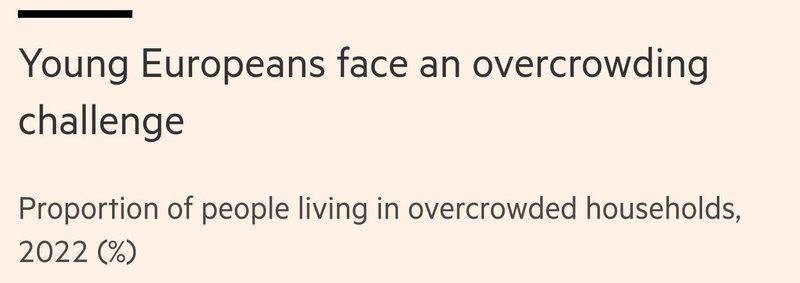
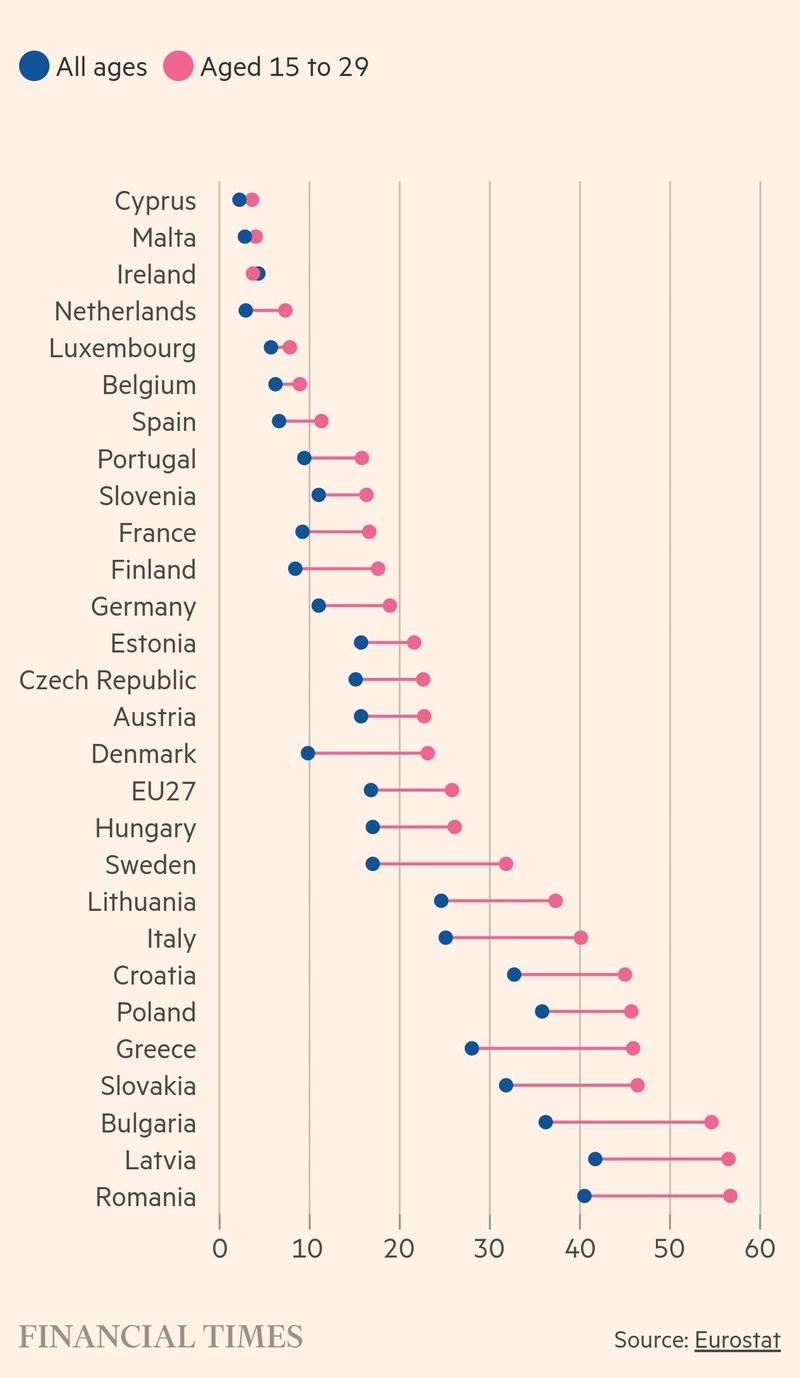
They are also having to live with their parents for longer. In countries such as Ireland, Portugal and Poland the pandemic contributed to the “boomerang effect” in which young adults returned to live with their parents as they could no longer afford to rent while the economy was put on hold.
彼らはまた、より長く両親と一緒に暮らさなければなりません。 アイルランド、ポルトガル、ポーランドなどの国々では、パンデミックが「ブーメラン効果」を引き起こし、経済が停止されている間に家賃を払う余裕がなくなった若者が親と暮らすようになった。
Rodrigo Martinez, an assistant professor of real estate at UCL who researches this phenomenon, warned that staying with parents for longer can affect young people’s socio-economic trajectories in the long term.
この現象を研究しているUCLの不動産助教授ロドリゴ・マルティネスは、親と長く一緒にいると若者の社会経済的軌道に長期的に影響を与える可能性があると警告した。
Staying in their hometowns can lead young people to miss out on jobs suited to them and lead to a vicious cycle of reduced economic opportunities. National economies and labour markets, meanwhile, risk remaining static from the lack of geographical mobility, he said.
若者が故郷に留まると、自分に合った仕事を失い、経済的機会が減少するという悪循環につながる可能性がある。 一方、国家経済と労働市場は、地理的な流動性の欠如により停滞したままになるリスクがあると同氏は述べた。
“Staying with your parents a couple of years longer means you will have a lower-paying job, it will be hard to find a family, you will be less likely to be in a couple, get married and be a parent,” said Martinez. “The ripple effect goes way beyond just spending a couple of years more at home.”
「両親と数年長く一緒にいるということは、低賃金の仕事に就くことになり、家族を見つけるのが難しくなり、カップルになったり、結婚したり、親になる可能性が低くなることを意味します」とマルティネスさんは言う。「その波及効果は、単に数年間自宅で過ごすだけではありません。」
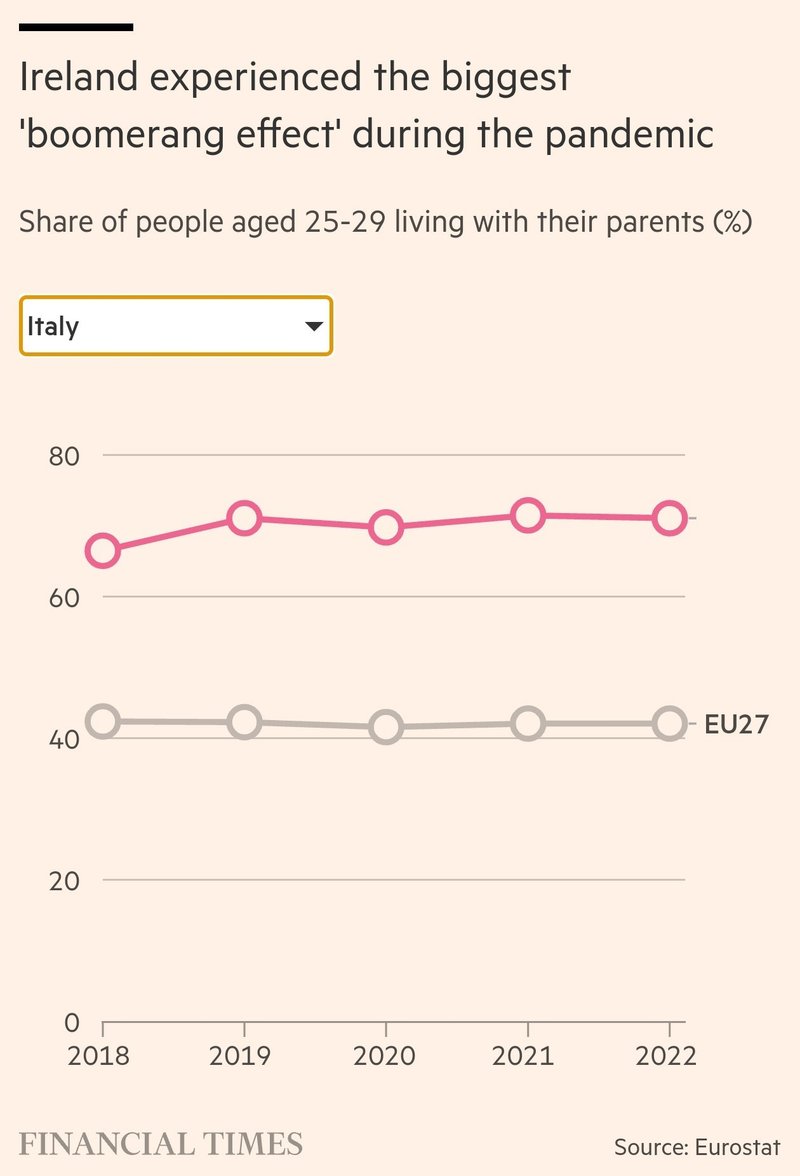
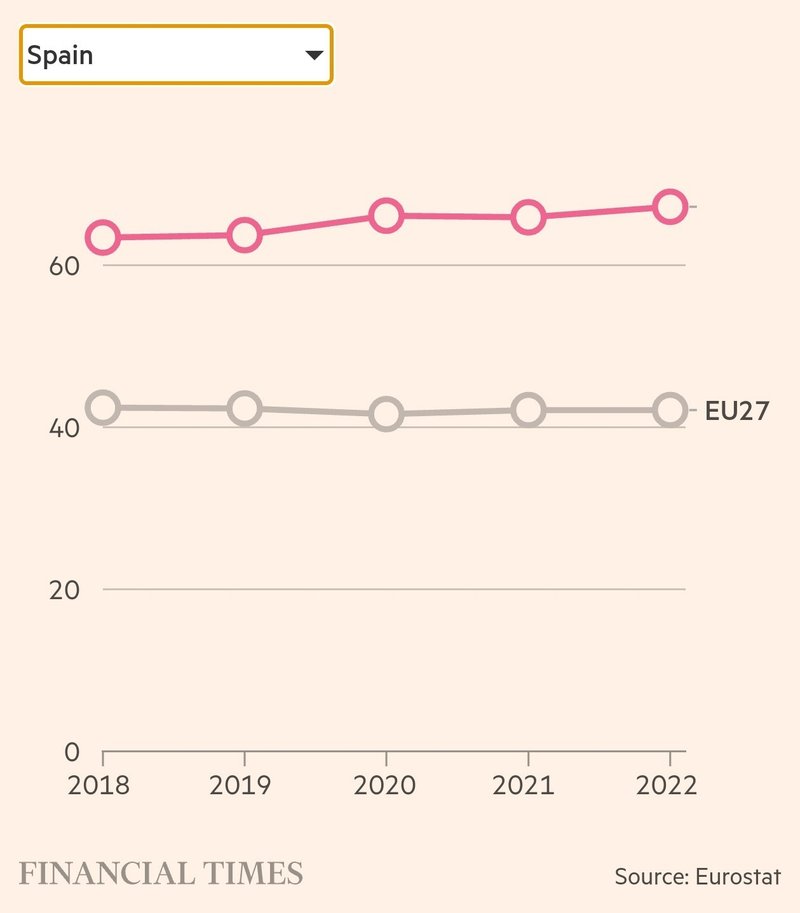
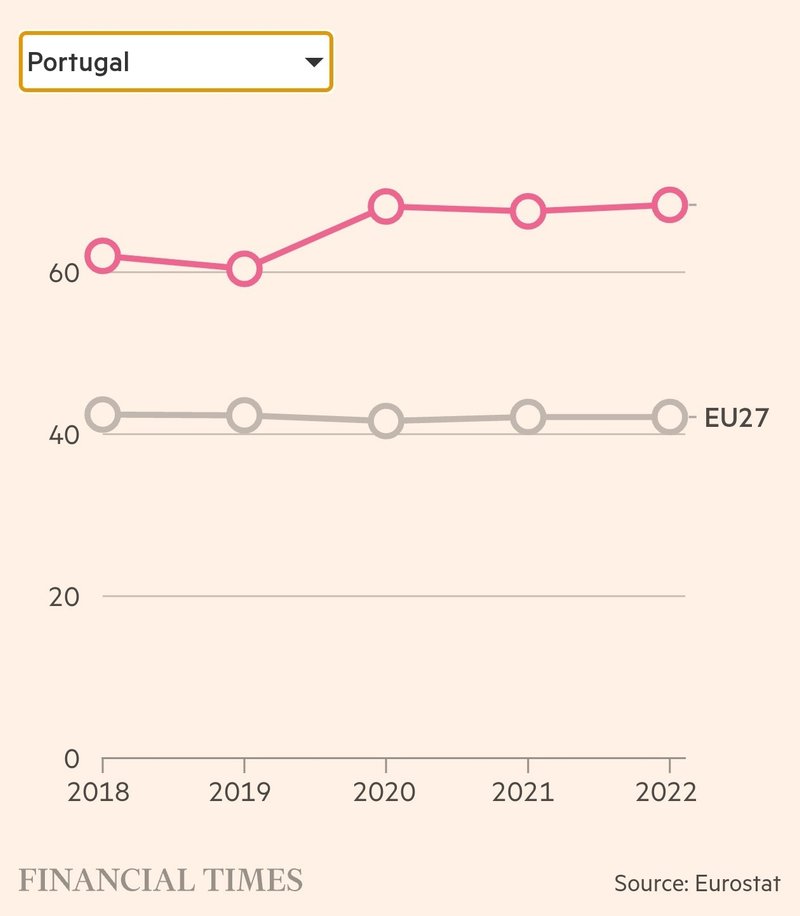
Rental markets across Europe are shaped by their histories and their governments. Romania has the highest percentage of homeowners in Europe, a legacy of the country’s move to a market economy in the early 1990s.
ヨーロッパ全土の賃貸市場は、その歴史と政府によって形成されています。 ルーマニアはヨーロッパで住宅所有者の割合が最も高く、これは 1990 年代初頭の市場経済への移行の名残である。
The fall of communism prompted many Romanians to purchase the flats they lived in cheaply as the country underwent a wave of privatisation and currency devaluation. Some other former communist nations, such as Slovakia, Hungary, Croatia, Lithuania and Poland, show a similar pattern. In western Europe, home ownership levels tend to be much lower.
共産主義の崩壊により、国が民営化と通貨切り下げの波にさらされる中、多くのルーマニア人は住んでいたアパートを安く購入するようになった。 スロバキア、ハンガリー、クロアチア、リトアニア、ポーランドなどの他の旧共産主義国家も同様のパターンを示しています。 西ヨーロッパでは、住宅所有率がはるかに低い傾向があります。
Some countries have used policy tools to favour home ownership; tax relief on mortgage repayments, for example, has made borrowing an attractive option in the Netherlands, said the OECD’s Cournède. This contrasts with Italy, where there are no such tax incentives and banks are more cautious about lending and forbearances on mortgage loans, he added.
一部の国では、住宅所有を促進する政策ツールを使用しています。 OECDのクルネード氏は、例えば住宅ローン返済に対する減税により、オランダでは借り入れが魅力的な選択肢になったと述べた。 これは、そのような税制上の優遇措置がなく、銀行が融資や住宅ローンの返済猶予に対してより慎重であるイタリアとは対照的であると同氏は付け加えた。
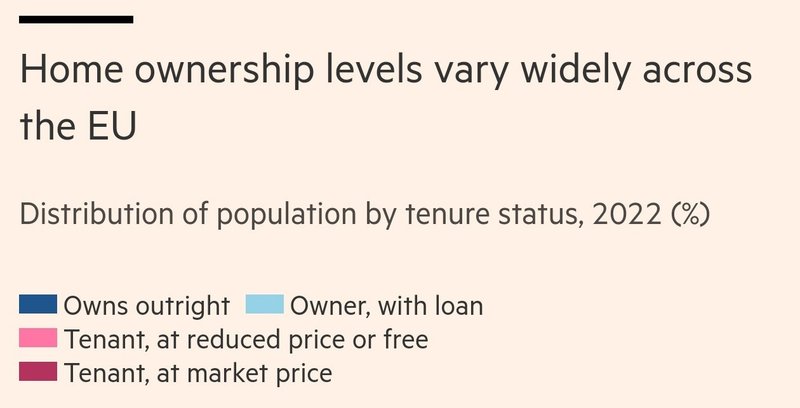
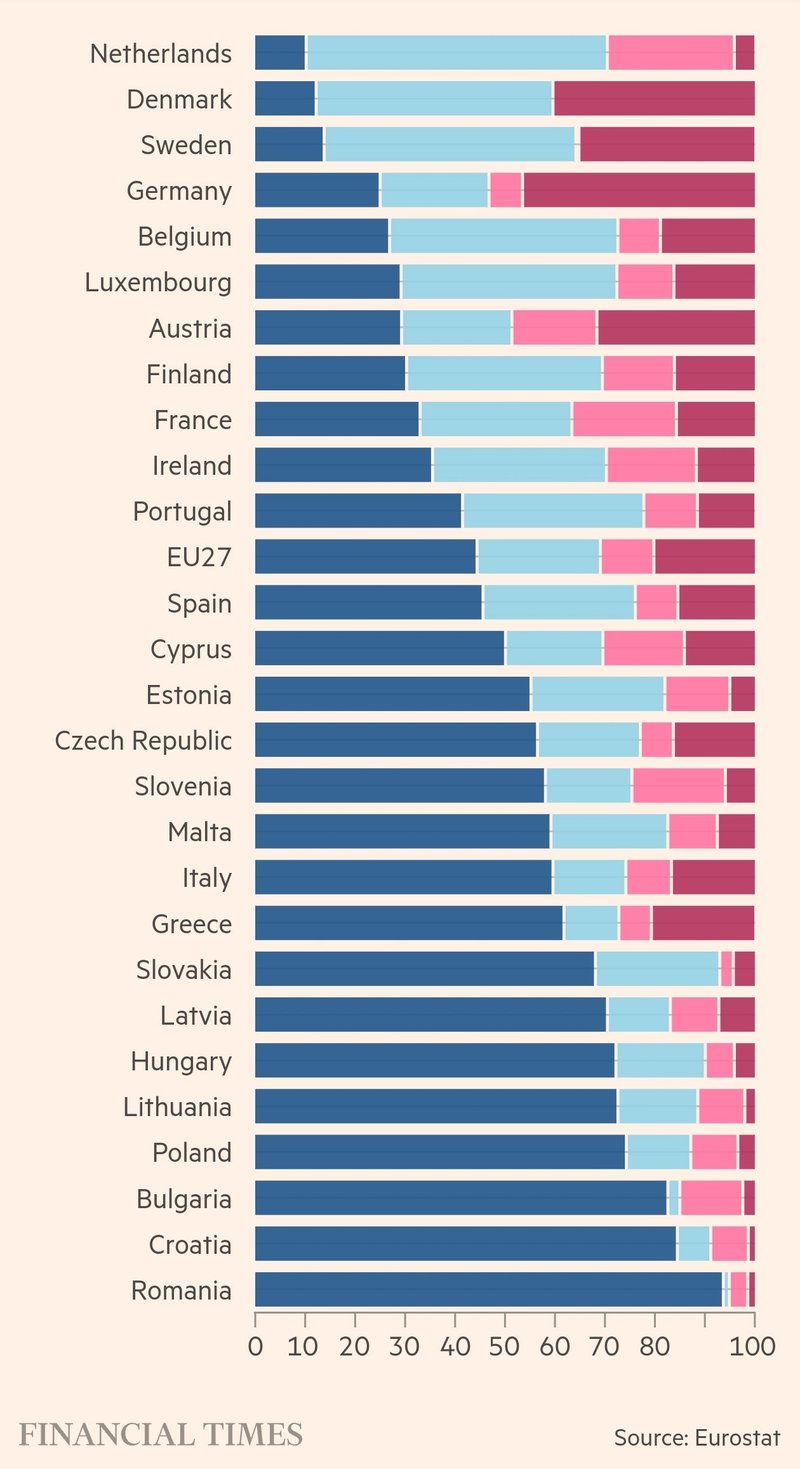
However, in cities with a high level of social housing, middle-income households may feel the squeeze more than those on lower incomes, said UCL’s Barnes. “If you’re lucky enough to get allocated social housing then affordability is not as much of an issue,” she added.
しかし、公営住宅のレベルが高い都市では、中所得世帯が低所得世帯よりも圧迫感を感じる可能性があるとUCLのバーンズ氏は述べた。 「幸運にも公営住宅が割り当てられれば、手頃な価格はそれほど問題ではない」と彼女は付け加えた。
Europe’s rental market is expected to remain tight. “Several factors, including rising construction costs, development challenges and increasing debt costs [continue to] contribute to the limited availability of prime inventory and the upward pressure on rental prices,” Savills said.
欧州の賃貸市場は引き続き逼迫すると予想されている。 「建設コストの上昇、開発の課題、債務コストの増加などのいくつかの要因が、主要な在庫の入手可能性の制限と賃貸価格の上昇圧力に[引き続き]寄与している」とサヴィルズ氏は述べた。
英語学習と世界のニュースを!
自分が関心があることを多くの人にもシェアすることで、より広く世の中を動きを知っていただきたいと思い、執筆しております。もし、よろしければ、サポートお願いします!サポートしていただいたものは、より記事の質を上げるために使わせていただきますm(__)m
